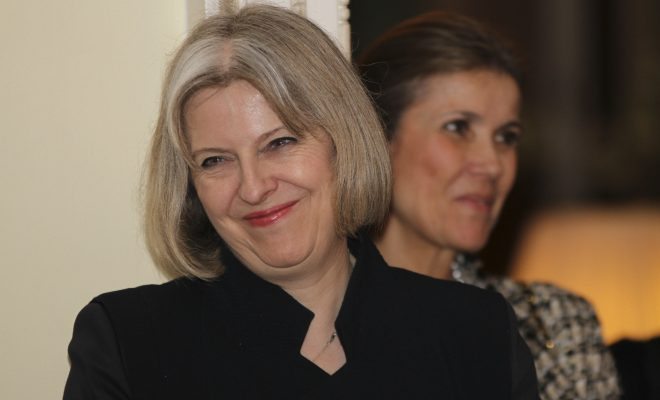 "Home Secretary Theresa May [Courtesy of U.S. Embassy London via Flickr]
"Home Secretary Theresa May [Courtesy of U.S. Embassy London via Flickr]
World
New Day In the UK: Theresa May Is the First Female PM In 26 Years
Britain has a new prime minister after Andrea Leadsom announced her exit from the race Monday morning. Theresa May, the 59-year-old home secretary, will replace David Cameron as the leader of the United Kingdom. Soon after Leadsom signaled her exit Monday morning, it became clear that few barriers still stood in May’s way.
First, Leadsom cleared the way for May to be the last woman standing, and the last candidate in a field that dwindled from five to two over the past few weeks. “Strong leadership is needed urgently to begin the work of withdrawing from the European Union,” Leadsom said Monday morning, reading from a letter addressed to the chairman of the 1922 committee (a group of influential lawmakers in the Conservative Party), Graham Brady. “[Theresa May] is ideally placed to implement Brexit on the best possible terms for the British people.”
So grateful for all the support – I do believe my decision is in the best interests of the country and our economy & I wish Theresa success!
— Andrea Leadsom MP (@andrealeadsom) July 11, 2016
Then, Michael Gove and Boris Johnson–two supporters of the “Leave” campaign that successfully sparked Britain’s exit from the European Union—voiced their support for May. Finally, once it became apparent that she would become his successor, Cameron read a statement in support of May, and said he would officially step down as prime minister on Wednesday. “I am delighted that Theresa May will be the next prime minister,” he said, calling her “strong, competent and more than capable.”
And at five o’clock Monday evening, May was officially coronated as the leader of the Conservative Party and prime minister of Britain. She paid tribute to her former opponents as well as Cameron, and said she was “[honored] and humbled to have been chosen by the Conservative party to become its leader.” Her statement continued:
During this campaign my case has been based on three things. First, the need for strong, proven leadership to steer us through what will be difficult and uncertain economic and political times, the need, of course, to negotiate the best deal for Britain in leaving the EU, and to forge a new role for ourselves in the world. Brexit means Brexit, and we are going to make a success of it.
Her second and third tenets, she said, will be to unite the country and make sure it works “not for the privileged few but that works for everyone one of us.” May will be the second female prime minister in Britain’s history, and the first since Margaret Thatcher, who led the UK from 1979 to 1990. In the months preceding Britain’s exit from the EU, May supported the “Stay” camp, though she did not project her stance as vigorously or vocally as other candidates. In her first official statement as prime minister and in remarks she gave earlier in the day, before Leadsom dropped out, May reiterated the fact that “Brexit means Brexit.” There would not be a second referendum, she said.
Not everyone in Parliament is unanimously in support of May, however. Three parties–Labour, the Liberal Democrats, and the Greens–are calling for a general election, saying that the Conservative Party no longer has the mandate to govern since its leader, Cameron, resigned. The next scheduled general election is in 2020, five years after the Conservative Party won its parliamentary majority in 2015.
With @TheresaMay2016‘s coronation we need an early General Election. The Tories now have no mandate. Britain deserves better than this.
— Tim Farron (@timfarron) July 11, 2016
But dissent from opposing parties will do little to halt the ascent of Britain’s newly minted leader, at least for the next four years: Prime Minister Theresa May.








Comments